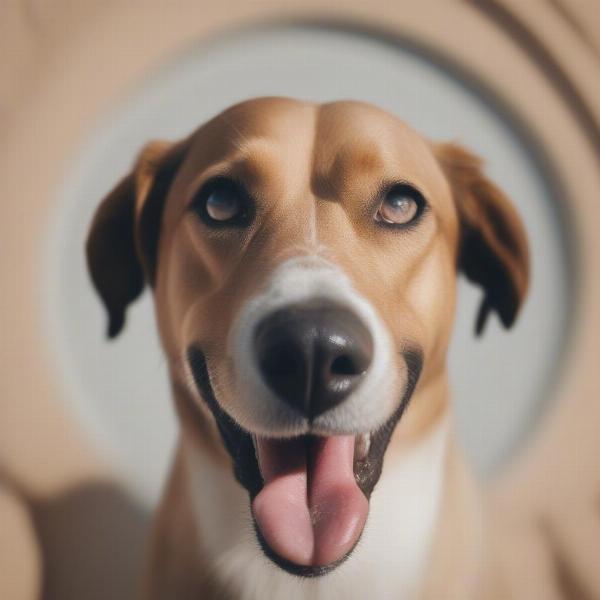The term “laughing dog” often conjures up images of a joyful canine with a wide, goofy grin. While dogs don’t laugh in the same way humans do, they certainly have their own unique ways of expressing happiness and playfulness. Understanding what constitutes a “laughing dog” and how to interpret their various vocalizations and body language is key to building a stronger bond with your furry friend. This article will delve into the intricacies of canine communication, exploring the signs of a happy dog and dispelling some common myths about dog laughter.
Dogs communicate through a complex combination of vocalizations, body language, and even scent. A “laughing dog” isn’t necessarily one that’s producing human-like laughter, but rather one displaying a series of behaviors that signify contentment and a playful mood. These behaviors can include a relaxed, open-mouthed pant often accompanied by a loose, wiggly body posture. Their tail might be wagging enthusiastically, and their eyes might be soft and bright.
The Sounds of a Happy Dog
While a belly laugh might be a uniquely human trait, dogs have their own “laughter” equivalent – the play pant. This breathy, slightly higher-pitched pant is often heard during playful interactions with other dogs or humans. It’s a sign that your dog is enjoying themselves and engaged in the activity. Other vocalizations associated with happiness include soft whines, excited barks, and even little yips.
 Dog panting with slightly open mouth
Dog panting with slightly open mouth
Body Language Speaks Volumes
A dog’s body language can reveal a wealth of information about their emotional state. A “laughing dog” will often exhibit a relaxed posture with a loose, wagging tail. Their ears might be perked up or slightly drooped, indicating a playful and receptive mood. Play bows, where the dog lowers its front end while keeping its rear end elevated, are a classic invitation to play and a sure sign of a happy dog.
Is My Dog Really Laughing?
The concept of a “laughing dog” is more of an anthropomorphic interpretation of canine behavior. While dogs don’t experience humor in the same way we do, they certainly express joy and playfulness through a combination of vocalizations and body language. Recognizing these signs can help us understand our canine companions better and strengthen the bond we share.
Common Misconceptions About Dog Laughter
One common misconception is that a dog showing its teeth is laughing. While a relaxed open mouth can be a sign of happiness, a tense, rigid mouth with bared teeth is often a sign of aggression or fear. It’s important to differentiate between these two very different expressions.
Encouraging Playfulness and Happiness in Your Dog
Providing your dog with plenty of opportunities for play, exercise, and mental stimulation is crucial for their overall well-being. Interactive games, regular walks, and positive reinforcement training can all contribute to a happy and well-adjusted dog.
Why is my dog panting with its mouth open?
Panting with an open mouth is often a sign of a relaxed and happy dog, especially during play. However, excessive panting can also indicate heatstroke or other medical conditions.
How can I tell if my dog is happy?
Look for a combination of relaxed body language, such as a loose, wagging tail, soft eyes, and a playful demeanor, along with vocalizations like play pants and soft whines.
Conclusion
Understanding what constitutes a “laughing dog” involves recognizing the subtle nuances of canine communication. By paying attention to their vocalizations, body language, and overall demeanor, we can gain valuable insights into their emotional state and build a stronger, more fulfilling relationship with our furry friends. Remember, a “laughing dog” is a happy dog, and fostering their happiness is a rewarding experience for both dog and owner.
ILM Dog is your one-stop resource for all things dog-related. We offer expert advice on dog breeds, health, training, nutrition, grooming, and much more. From puppy care to senior dog care, we’ve got you covered. Visit our website at ILM Dog for a wealth of information and resources to help you provide the best possible care for your canine companion. Contact us at [email protected] or +44 20-3965-8624 for personalized guidance.